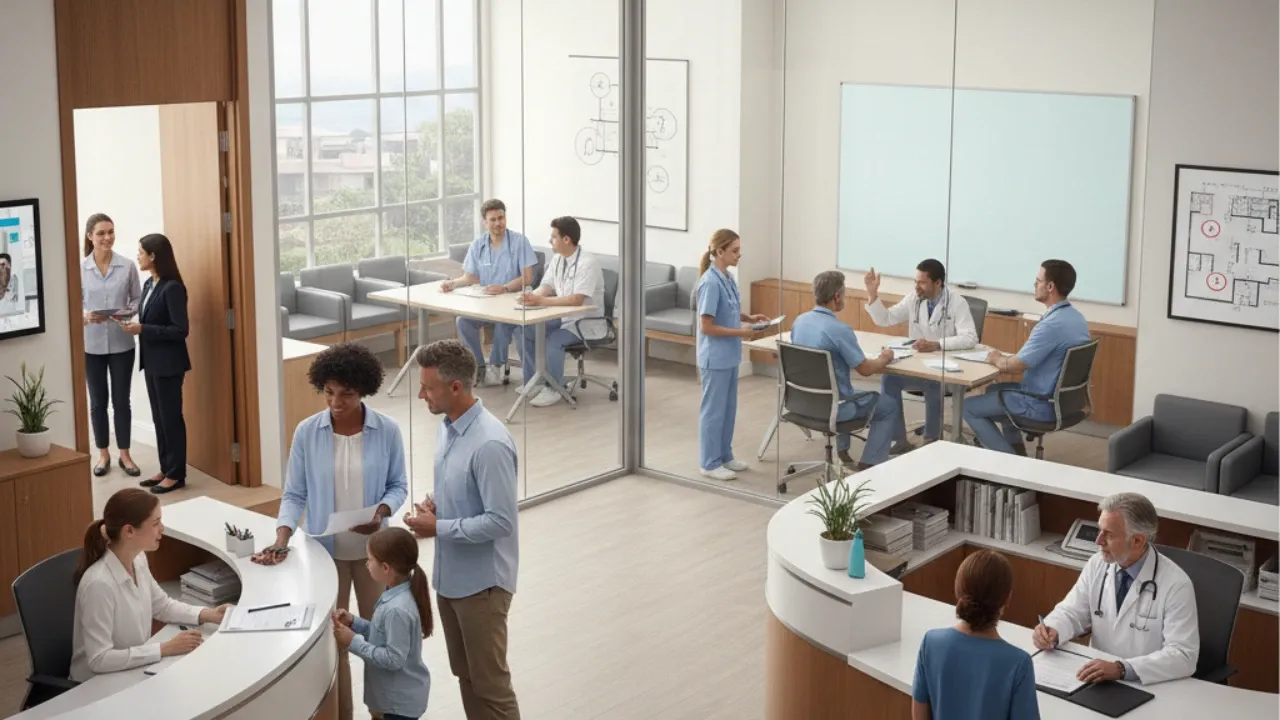
Choosing the best system for medical clinics is among the most strategic decisions a healthcare manager can make. Beyond directly impacting operational efficiency, the selected software influences patient experience, team productivity, data security, and the institution’s financial sustainability. In an increasingly competitive and digital market, it’s not enough for the system to merely “work”: it must adapt to the clinic’s routine, offer scalability, and align with management best practices.
With so many options available, many managers ask: ultimately, what is the best system for medical clinics? The answer isn’t a specific brand, but the criteria that define a smart choice. In this article, we’ll cover those criteria, how they affect daily operations, and how Ninsaúde Clinic positions itself as a solution aligned with the sector’s needs.
Before we continue, we need to ask: Are you already familiar with Ninsaúde Clinic? Ninsaúde Clinic is a medical software with an agile and complete schedule, electronic medical records with legal validity, teleconsultation, financial control and much more. Schedule a demonstration or try Ninsaúde Clinic right now!

Understanding the clinic’s real needs
Before choosing a system, it’s essential to understand your clinic’s specific challenges. There is no universal solution. Each institution has its own size, patient volume, multidisciplinary team, and specialties. In addition, each clinic’s level of digital maturity directly influences how the system will be implemented and used.
Key points to map include:
- Number of patients seen per day;
- Level of integration between front desk, finance, and clinical teams;
- Need for recurring appointments or session packages;
- Requirement to manage insurance contracts and claims;
- Relevance of features like telemedicine, digital signature, and CRM;
- Number of locations or branches that will use the system;
- Ability to adapt to specialty-specific clinical protocols.
With this groundwork, it’s easier to compare system features with the clinic’s real needs, avoiding impulse decisions or choices based solely on price.

Criteria for choosing the best system for clinics
Below are the core criteria that should guide your evaluation of medical software, with practical notes to help you assess vendors:
1) Comprehensive, customizable Electronic Health Record (EHR)
The EHR is the heart of clinical operations. A strong system should support:
- Detailed, specialty-specific documentation;
- File attachments like tests and images;
- Secure sharing among healthcare professionals;
- Visual longitudinal view of the patient over time;
- Structured and unstructured fields adaptable to different workflows.
Features such as ready-to-use anamnesis templates, customizable forms, and integration with digital signatures (with legal validity) add value to daily practice and strengthen the institution’s legal safeguards.
2) Integrated, intelligent scheduling
Scheduling must be more than a calendar. Modern systems offer:
- Online booking with public, per-provider links;
- Automated confirmations via WhatsApp, SMS, or email;
- Pre-visit digital check-in completed by the patient;
- Daily or time-slot caps by payer/plan;
- Queue management with automated patient calling.
These features reduce no-shows, boost front-desk productivity, and optimize visit time. A well-built schedule also improves the patient’s perception of organization.
3) Integrated financial management
Financial control is fundamental. An ideal system should include:
- Cash flow (projected and actual);
- Accounts payable/receivable with automated reminders;
- Management reports and P&L by location;
- Commission and revenue-share calculations by provider or department;
- Payment integrations and exports for accounting.
Avoid systems that force parallel spreadsheets or basic external integrations. Centralizing financial data improves predictability and reduces errors.
4) Insurance billing and claims management
If your clinic accepts insurance, robust claim generation and tracking is indispensable. The system should:
- Produce all necessary claim types required by payers;
- Generate files in required formats (e.g., ANSI X12/HL7 or payer-specific);
- Track status (pending, submitted, denied);
- Provide reports on denials, production, and payer revenue.
A solid billing module reduces financial leakage and prevents rework with payers.
5) Medical CRM and patient communications
Retaining patients is as important as acquiring them. A good system should offer:
- Patient base segmentation by profile and history;
- Automated emails with reminders and relevant content;
- Logged follow-ups and return dates;
- Sales funnels tailored to service type or specialty.
These resources raise return rates, increase patient satisfaction, and strengthen clinic-patient relationships.

6) Security and data-protection compliance
In the United States, HIPAA compliance is non-negotiable. A secure system should:
- Use end-to-end encryption for all data;
- Maintain audit logs for access, changes, and deletions;
- Enforce role-based access control at user and provider levels;
- Consider international frameworks like GDPR when applicable.
Information security is a foundational pillar of modern clinics.
7) Humanized support and training
Support quality is a decisive differentiator. Prefer systems with:
- Service via WhatsApp, email, and phone—without ticket bottlenecks;
- Fast responses from specialized teams;
- Onboarding staff for personalized guidance;
- Built-in how-to videos and up-to-date tutorials.
The implementation experience directly affects team adoption.
8) Integration with other systems
A robust platform should communicate well with your existing tools—ERPs, BI platforms, e-prescribing systems, and more. An open, well-documented API with active technical support is essential for clinics looking to scale operations.
Extra features that make a difference
Beyond the essentials, several complementary capabilities add significant value:
- Integrated telemedicine: secure video visits, e-prescribing, and automated confirmation.
- Integrated payments: ability to collect by card or ACH directly in the system (and Pix where available), auto-reconciling into finance.
- Electronic signatures: for consent forms, contracts, and other documents, with secure storage and automatic email delivery.
- Smart check-in and self-service: reduces front-desk workload, shortens lines, and improves the experience from arrival onward.
- Custom dashboards by location or franchise: enabling standardization and centralized oversight across multiple clinics.
A practical example: how Ninsaúde Clinic meets these criteria
Ninsaúde Clinic is a management software for medical and health clinics that checks all the boxes mentioned in this article. Built by a healthtech with 10+ years of experience, it offers:
- A customizable EHR with specialty templates and bespoke forms;
- Intelligent scheduling with automatic confirmations, digital check-in, and payer caps;
- A complete financial module with cash flow, reports, commissions, and payment integrations;
- Insurance billing and claims tracking with productivity and denial-management reports;
- Medical CRM and marketing tools with relationship funnels, campaigns, and automated follow-ups;
- Security aligned with HIPAA, end-to-end encryption, and real-time audit logs;
- An open RESTful API for integrations with accounting, BI, ERPs, and external platforms;
- Exclusive features like Ninsaúde Pay, Ninsaúde Sign, and Ninsaúde Safe, expanding control over the patient journey and the safety of internal processes.
Ninsaúde also provides agile, humanized support without tickets, via WhatsApp, email, or phone. The platform includes interactive training, how-to videos, and support materials accessible directly in the system—simplifying onboarding for new teams and driving continuous improvement.

A system for clinics that want to grow safely and efficiently
Choosing the best system for medical clinics demands planning, long-term vision, and a clear grasp of available resources. More than selecting software, managers should look for a technology partner that understands the institution’s needs, delivers humanized support, and drives real productivity gains.
In that sense, Ninsaúde Clinic stands out as a complete, robust, and flexible solution—ready to scale with your clinic and ensure integrated, secure, and patient-centered management. For clinics aiming to evolve with efficiency, quality, and innovation, adopting a system like Ninsaúde Clinic can be the most strategic step toward the future of digital health.
Liked the information? Then prepare for a continuous journey of knowledge by following our blog. Are you a health professional and not yet familiar with the benefits of Ninsaúde Clinic? Stay ahead, optimize your processes, and elevate excellence in patient care!

